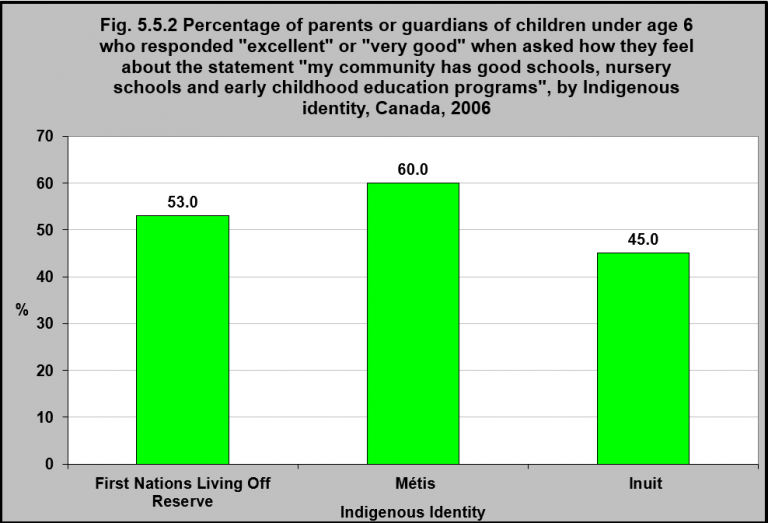Percentage of parents or guardians of children under age 6 who responded “excellent” or “very good” when asked how they feel about the statement “my community has good schools, nursery schools and early childhood education programs”, by Indigenous identity, Canada, 2006

Source: CICH graphic created using data adapted from Statistics Canada, Aboriginal Children’s Survey, 2006. http://www.statcan.gc.ca/pub/89-634-x/89-634-x2008005-eng.htm -accessed August 2, 2017.
In 2006, under half – 45% – of parents/guardians of Inuit children under age 6, responded ‘excellent’ or ‘very good’, when asked how they felt about the statement “My community has good schools, nursery schools and ECE programs”.
The percentage was greater for parents/guardians of First Nations children under age 6 living off reserve and parents/guardians of Métis children under age 6.
Implications
Early childhood education (ECE) is critically important for the emotional, social and physical development of young children which sets the foundations for well-being throughout the life course. Children’s early experiences, including the bonds they build with their parents and early learning, have life long impacts on learning, behavior, and physical and mental health.1 Many Indigenous children experience multiple forms of adversity, and early interventions are more successful in preventing the consequences of this adversity than later life interventions.1 However, many Indigenous children do not have access to quality early childhood development programs. For Indigenous peoples, quality ECE programs foster positive cultural identity, address differences in learning styles, and take into account Indigenous values and beliefs. Key components of such programs have been identified as ones which: 1) support Indigenous pedagogy; 2) promote Indigenous languages and culture; 3) are adequately staffed by qualified Indigenous educators; 4) empower Indigenous parents and communities; and 5) for kindergarten services, provide a full-day timetable.2
1Shonkoff, J.P., & Richmond, J.B. (2009). Investment in early childhood development lays the foundation for a prosperous and sustainable society.
2Preston, J. (2014). Early childhood education and care for Aboriginal children in Canada. Moving Childcare Forward Project. Toronto,ON: A joint initiative of the Childcare Resource and Research Unit, Centre for Work, Families and Well-being at the University of Guelph, and the Department of Sociology at the University of Manitoba. Retrieved September 22, 2017 from https://movingchildcareforward.ca/images/policybriefs/MCCF_aboriginal_childcare_canada.pdf
